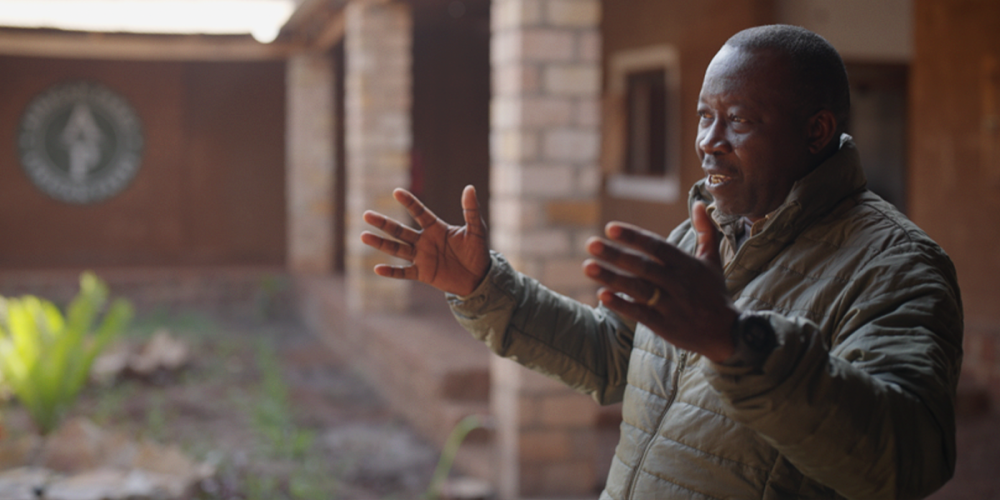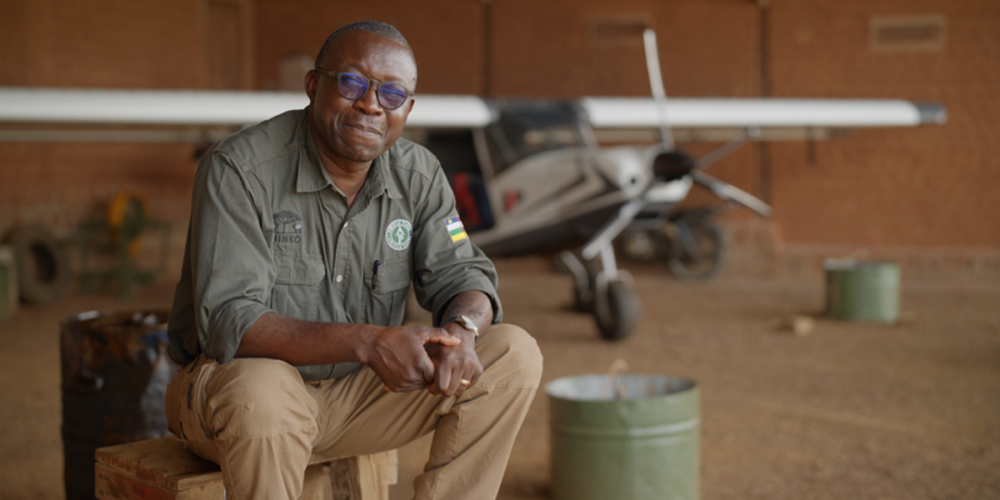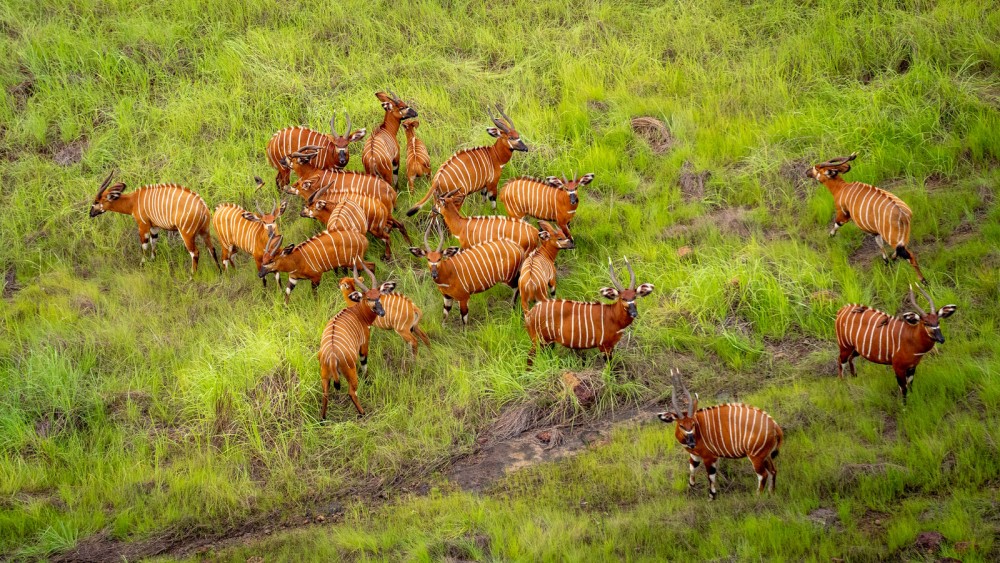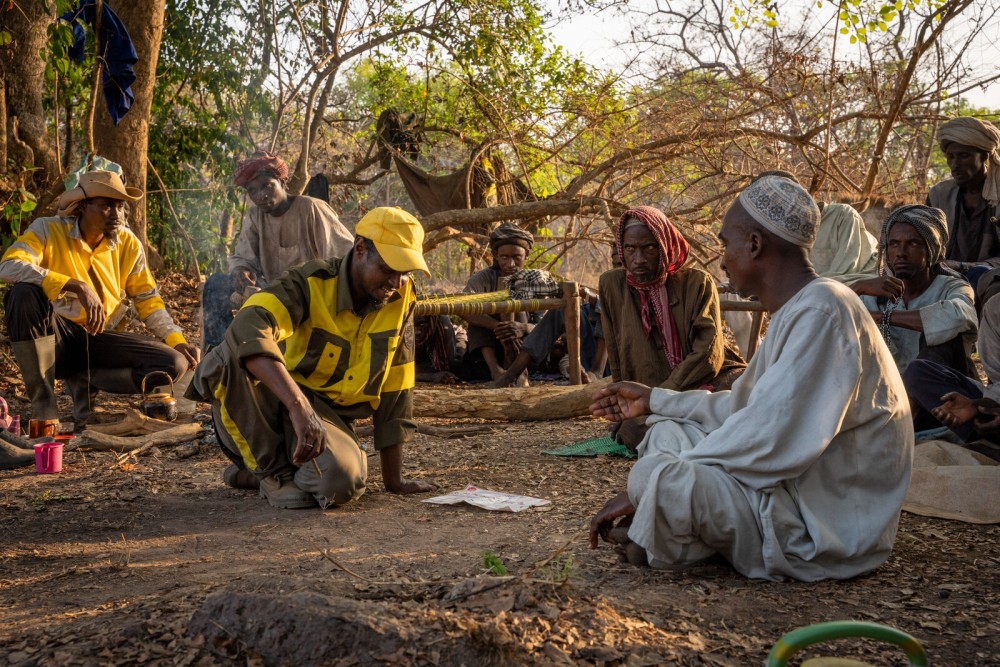Jean-Baptiste Mamang-Kanga grew up in the forests of the Central African Republic (CAR), where a seed for revering nature was sown. Since then, he has dedicated over 25 years to nature conservation. In 2022, he commenced his role as General Manager of the Chinko Conservation Area (CCA), a 55,000 km2 sanctuary for some of Central Africa’s most critical biodiversity and endangered species. Here Jean-Baptiste tells us why he chose to take on this important role for his people and country.
How did your interest in biodiversity conservation develop?

My grandfather was a great farmer and a famous hunter who was respected in our community. He mainly hunted buffalo and antelope as well as primates, which was legal back then. My father worked as a ranger before turning his attention to fish farming. I therefore grew up in a reserve in the middle of the forest with my family, but my passion for wildlife came later. After studying forestry engineering, I started working in the Ministry of Forestry, doing forestry inventory for three years in the south east of CAR before being sent to the north east where I spent the next 13 years working for the Ministry in various positions. It was during this time in the north east that I started to appreciate and admire nature, learning from my colleagues about biodiversity, law enforcement and community development. I went from seeing animals as a source of food to be exploited to enjoying their presence and taking interest in their interactions and personalities.
Why did you choose to stay in CAR to promote conservation?
I chose to work for wildlife in my country, because I believe on an economical level, conservation is a very important component of our national economy. It is a great opportunity to create a source of income and development to isolated regions. During my career, I have seen many children, who could not afford to go to school, benefit from conservation and get access to education, healthcare, and communities, where pensions for their elderly have been organised. This has enabled regions where there was no hope for access to other sources of revenue to now access development. It creates opportunities of employment for Central Africans.
Why do you work for African Parks?
 © Warren Smart
© Warren SmartI chose African Parks, as I genuinely believe they are the best at what they do. CAR has a total of 16 protected areas (parks and reserves) where there used to be a great amount of biodiversity. Unfortunately, with the political and social instability that our country has experienced, these parks and areas have existed on paper, but management has been non-existent. An organisation was needed to support this process. When African Parks offered to support the CAR Government in managing Chinko, the government embraced the opportunity to form a partnership, believing that African Parks had the capacity to support the management of this area. African Parks arrived at a time (2014) where much of Chinko’s biodiversity had been destroyed and the situation was catastrophic (after the height of the civil war). Today, fauna is back to 70% of what it was originally. It is important to recognise that African Parks has had a very positive impact due to its high capacity to reach targets set by the CAR Government. AP is the biggest employer in the east of CAR, employing over 500 permanent and casual employees on average every year.
Why did you choose Chinko?

I was part of the founding of Chinko and wrote the first convention when I was Director of Fauna and Protected areas. I, myself, signed the letter which approved the creation of Chinko. Of all the opportunities that were given to me, I chose Chinko. I had the opportunity to take on high level positions in the Ministry, but my passion for nature brought me back to field work. I chose to not be a politician. I wanted to be a model for the future generation - it’s not all about being in a high, well-paid position in the government, but about being on the ground and acting for your country. Many are shocked by my choice and ask me why I left the Ministry. I always answer that this is what I care about and I will see this through and contribute to changing our reality and bringing hope.
What is your message to the future generation?
For the future generation, it’s important to have people in our administration that contribute to the growth of our country. Staying in Bangui and dressing up for workshops and events is not enough. We need to be dynamic.
My challenges working in conservation in CAR were mostly linked to gaining the trust of the communities who first rebelled and attacked when I was trying to apply the law. Once, when I was working for the government and tried to arrest some people who were illegally hunting, the whole village turned around and beat me. I was confronted with corrupt officials, politicians and ministers who tried to impede me from applying the law. During the rebellion, I was forced to take my staff and flee as they were trying to kill me.
Why do you think it is important to have a Central African Republic national at the helm of Chinko?
My integrity and my stance on corruption during my career in the Ministry led me to gain trust on both sides. I believe I was able to help African Parks by ensuring the cooperation of central African administrative and political authorities and their understanding of the meaning and importance of our work here.
What do you believe has been the key to success for Chinko?

African Parks has enabled the restoration of fauna and cooperation from local communities and political and administrative authorities through its activities. Especially through the Committee for Protected Areas and their Peripheries (CPAP), where local communities and their leaders can discuss the activities of the year and those planned for the future. This has been a great success.
In the past many clashes used to happen between rangers and poachers. But Chinko’s innovative approach of using Tango and Echo teams has been an incredible success, enabling the management of transhumance movement in a non-violent way. This needs to serve as a model and be replicated in other areas. I believe in this model and in the positive impact and work done with and for the Central African Government. I hope and wish that African Parks will be given the opportunity to manage other Central African parks especially given that many parks in our neighbouring countries are also managed by them. The landscape approach is essential in this context and will guarantee long term success of conservation in this region (Chad, DRC, and South Sudan).
Your Support Goes a Long Way
At African Parks we are working everyday to protect Africa's last wild landscapes. By donating to us, you are making a difference and are giving hope to people and wildlife across the continent.
Donate